What It Takes: Marie Jean Baptiste Founder Of Rue107 On How She Went From Nurse To CEO
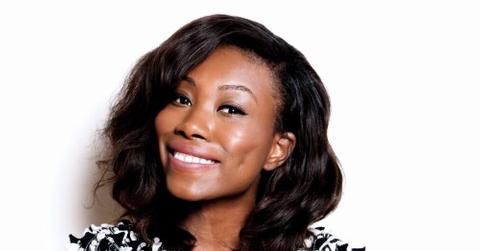
It’s not easy to give up a ten year career in nursing to self-fund your dream. But it’s not impossible.
Just ask Marie Jean Baptiste the 31 year-old Haitian-American designer who founded Rue 107. That was five years ago. Today, Rue 107 has been worn by celebrities, opened a storefront in New York, and has exciting plans on the horizon to outfit not only your body in Rue designs, but also your home. During our interview, Marie Jean Baptiste revealed why her spirituality is so important to her and what lessons she has learned from her failures and successes as Founder and CEO of Rue 107.
Her Agenda: I found it really interesting that you initially were in nursing. How did that happen? How did you transition from nursing to fashion?
Marie Jean Baptiste: It might seem really crazy, but if you know any Haitian families this might make a lot more sense. We like “safe careers” so there was a lot of pressure to study something safe. When I was in high school my parents enrolled me in an LPN program so I basically finished high school as an LPN and I started working on a geriatric floor when I was 17. I did apply to FIT and they rejected me so I decided to study nursing.
I really liked helping people and by the time I was 25 I had been doing it a long time, but I really felt like I needed to do what I needed to do. So the whole time I was in nursing, I was interning, learning about the fashion industry. When I was 26 I decided I had given nursing a lot of years — almost 10 years, so I decided to take the leap and do fashion full time. So it was a seamless transition in that way, in my head. But the nursing [career] was the best foundation I could ask for because it gave me discipline, the [skillset] to build a team and put care for people first.
Her Agenda: So you just felt like you had given it 10 years and it was time to do what you loved. Did you have a mentor or someone help you realize it was time?
Marie Jean Baptiste: Yes, I assisted one of my favorite designers Lemington Riddley (he now resides in London). He took me on at a really young age— I was 19 when I met him. And he taught me everything. From how to sew, to how to embroider, to everything. He showed me all the technical stuff that I learned and really gave me the confidence to take the leap of faith. Funny enough, he actually left fashion and is a full time ballroom dancer now. But he was definitely the key person to give me that extra push and confidence to go for it.
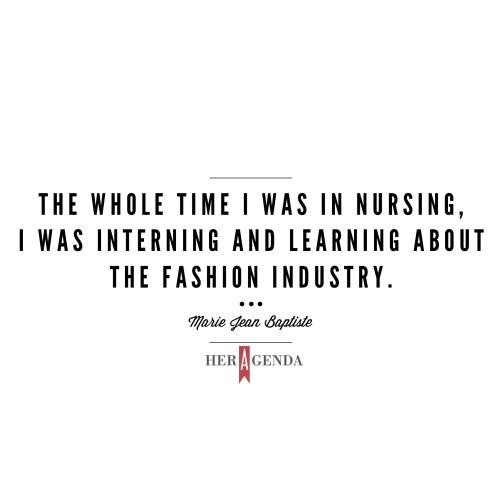
Her Agenda: So literally the whole time you were nursing you were learning this craft?
Marie Jean Baptiste: Absolutely. Basically I would work and go to school and do a bunch of internships, pop up shops on weekends and anything else I could. I had no fun in my twenties. All I did was work because I was learning this craft and also I had to work full time and go to school. Sometimes I regret that. I didn’t really travel or enjoy my twenties at all. I didn’t leave the country until I was 28. But I was building and building and building.
It was like now or never. I had to do it or I knew I would regret it forever. -Marie Jean Baptiste via @HerAgenda
Her Agenda: Did you ever feel that fear to take a risk?
Marie Jean Baptiste: Absolutely, but at the same time the powerful thing about youth sometimes is being really naïve and sometimes going into things blindly. That has its pros and cons. It was like now or never. I had to do it or I knew I would regret it forever. I had to cut off my family for over a year and really keep my distance to protect myself and my dreams. I couldn’t explain it and I didn’t need to ask for approval. They just didn’t understand. They just wanted what was best for me, but it was crucial. I couldn’t sleep. I could almost taste it. I had to do it. That was stronger than not doing it. And that wasn’t an option to me.
But looking back on it there was definitely a build up. It was more like I felt it was coming and so it became so loud. It was either ignore it and have a complete nightmare of a life or go to it and deal with all the brutal attacks of being an entrepreneur but living it. I definitely agree with you in terms of fear of failing, due to family, friends, and culture. —There are so many reasons not to do it. However, I find it interesting that we (black women) are the fastest growing group of entrepreneurs in the country so that says a lot for sure. It’s definitely our time.
…work as hard on your spiritual side as you work on your hustle, because you will need it. -Marie Jean Baptiste via @HerAgenda
Her Agenda: What would say to a younger version of yourself preparing to make this journey?
Marie Jean Baptiste: I would definitely say work as hard on your spiritual side as you work on your hustle, because you will need it. And I think one of the biggest reasons people fail, myself included, when I did hit that ground level of failure I felt like I was very spiritually empty. Sometimes our dream and business becomes our religion, our being, our identity, and you have to separate yourself from the business and from the journey of entrepreneurship. I would tell people to really focus on their spiritual being because ultimately you will lose a lot of money, you will lose friends, you might lose family, you will lose customers, you will lose some of yourself, but faith is the one thing that stays constant. It will get tested but it never really disappears so nourish that. I wish I would have nourished that more. The anxiety might have diminished quite a bit if I relied more on my spirituality versus all the external factors.
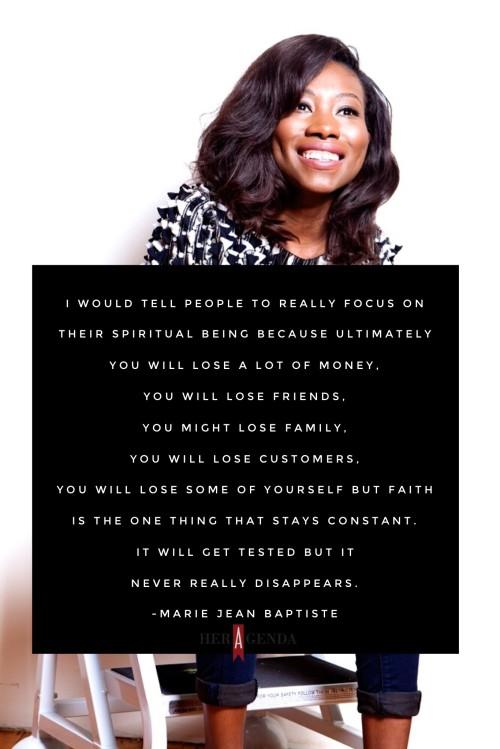
Her Agenda: How did you reach this conclusion that spirituality was key? Was it through wisdom you gained over the years? A byproduct of being more confident? Or something else?
Marie Jean Baptiste: Confidence is always in the works, obviously I’m more confident now than I was five years ago. However, the beauty of failing is you can’t have fake humility after failing. You either become really humble and you learn your lesson or you give up. So there’s not really much in between. My spiritual awakening came at the lowest point in my business and realizing that you will lose it all—literally. I reached that point and when I reached out to other people about the psychological affect of failing I saw that a lot of people go through it but don’t talk about it. I started having dark thoughts. How do you lose so much money, how do you make so many people angry when I’m just one person? It was really self-assessment at the deepest level. And somehow in the middle of all the darkness you meet God. It might sound a little dramatic, but for me that’s when I really reconnected with my spirituality. I have been so much better ever since in every way. I realized then it’s not just about RUE or whatever. It’s so much bigger than that. Even if [your] business fails, you are not a failure. It’s still okay. That’s when I found my spiritual awakening and it’s really become a daily practice for me. It’s been really, really beautiful for me.
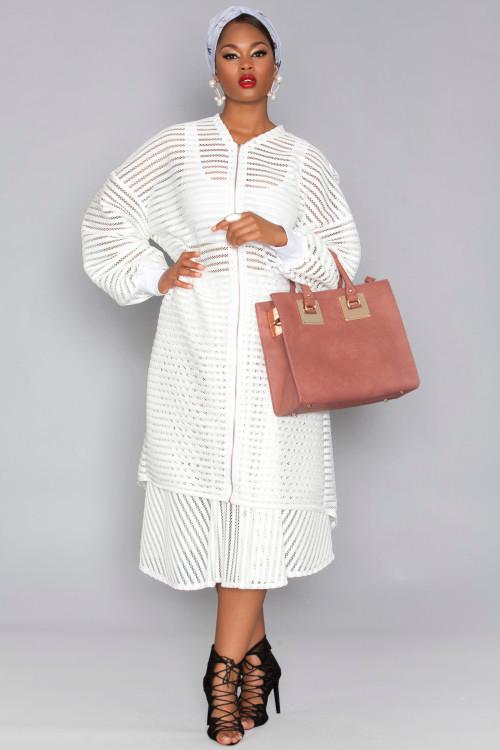
Her Agenda: Thank you so much for speaking on that. I think when we think about growth we really should think of it from a holistic perspective, your health, your mental health, your career… it really says a lot about you that you’ve touched on that as well.
Marie Jean Baptiste: In business that part is often so far removed and it needs to be talked about. Because so many people are really hurting they’re in massive debt, they’re losing control, they’re drowning in fear and yet still everyone’s wearing red bottoms, being fabulous, and drinking cocktails.
Her Agenda: How did you get Rue off the ground?
Marie Jean Baptiste: When I made the transition to fashion full time it was Facebook really to be honest with you. A few years ago Facebook was really simple. It was at the forefront of social media and you could build a lot of buzz for free without paying for advertising. So I was really lucky back then to have that early on and really go viral before viral was a thing. …. A few months after going full time I got really lucky because Nicki Minaj actually wore Rue. She opened a concert in Rue and that was really the beginning for us. Her stylist tweeted about it and the whole thing went viral. The website crashed and that was really the beginning of everything.
A photo posted by RUE107 (@rue107) on Aug 15, 2012 at 7:39am PDT
Her Agenda: So did Nicki Minaj wearing your clothes have anything to do with you wanting to serve more curvy women or was that always your mindset?
Marie Jean Baptiste: Again, maybe I was naïve but I felt like a woman who wanted to feel sexy just wanted to feel sexy. I never really thought of a woman as her size. Maybe that’s cultural. Initially I think it was definitely cultural. I was very naïve. I didn’t realize how divided the business of fashion was in terms of body and size so it wasn’t intentional. It was more like I have a girl in size 12 and she looks great so why can’t I post her? She looks happy and that’s what I do. I’m a size 4 myself, I don’t dissect bodies in that way. My sister is a size 20. We don’t aim to be a size 2, that’s just not how we think.
It created division between our customers because a lot of skinny women don’t identify with plus size clothing and vice versa. Business and consumer behavior shows that if I post a girl who’s a size 4, sales on the plus size would drop and vice versa. It’s been very challenging to merge all our customers and bring them to the same place. But I never intended to say I was going to dress one body type over another I just wanted to make women happy period, and uplift women, and make them look sexy and fun. It was never about bodies, but it definitely took that turn after we started adding more body diversity.
I just wanted to make women happy period and uplift women and make them look sexy and fun. -Marie Jean Baptiste via @HerAgenda
Her Agenda: Are you mostly an observer or how do you find out what women are in to?
Marie Jean Baptiste: I would definitely say that for Rue I have a very good grip on what the customers are saying. I still monitor all the customer emails. Every complaint gets emailed to me directly, even if it’s resolved I have a log for it. Even if I don’t have all their information I’ll know what the complaint is. So I have a very hands-on approach on what my customers are saying and what needs to be better. My girls are very vocal, which helps. So they’ll tell what is not working and what is working.
Social media is also a good way to see what people are saying. And now with the showroom people come in and shop and I get to talk to people in person and get even more information on what’s going on, feedback, and learning how to service my girls better. And again when I slack on that I pay for it. It’s a part of the business. I’ve definitely learned how important that component is, to just be of service to your customers versus telling people what to do. It’s a slippery slope between being a designer and presenting a product, but also being of service and assessing what a customer’s needs are.
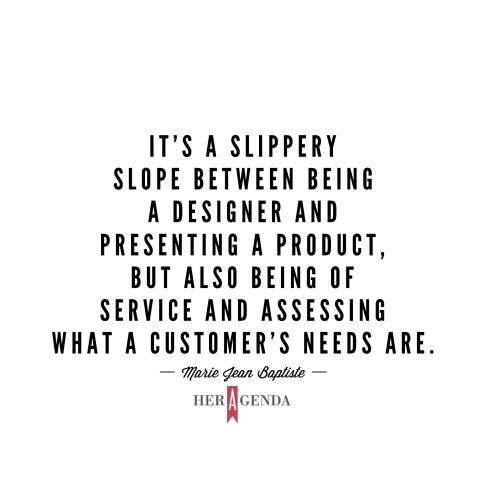
Her Agenda: So are you the sole investor?
Marie Jean Baptiste: Yes, Rue has been self-funded since day one. I hired a strategy partner in January, but again it’s no funding it’s really just to grow the business. As we’re scaling and growing in staff (Rue now has 11 employees) and in space, I felt like I needed an expert to help me through that process. But no we’ve never been funded. I’ve taken small business loans but everything is paid back. Sometimes I do think maybe I should get some funding. I’m not opposed to giving someone a piece of the pie. But so far I haven’t done that yet.
Her Agenda: So for the woman who wants to start their business 100% on their own, what would you say to her?
Marie Jean Baptiste: My personal philosophy is you don’t need to start any thing with more than $5k and even that’s a lot. In this day and age with the amount of resources that we have, I can’t think of any business that requires more than that in the first three months. What people tend to do is they over-assess and have an information overload thinking they need so much before they have one customer. The reverse should be the case: get one customer first and solve the problem.
…get one customer first and solve the problem. -Marie Jean Baptiste via @HerAgenda
People think they need so much to start a business upfront. Of course as the business expands you will need more capital and whatever you think you’ll need you should multiply it by three, but that’s a different stage. So initially focus on really understanding your customer and servicing them and the money will come. It’s the law of attraction. If you focus on that and you focus on the customer, and you focus on a solution, you don’t need as much money upfront to start. There are so many affordable ways of selling your services before you need to invest in marketing and photo shoots. I meet people who tell me they want to be a designer and have already spent $5k on a shoot but have no customers.
Eventually people will pay you for [your work] so you have to respect that process. Really it’s about servicing them and eventually the followers and marketing will fall into place. Focus on the core mission before spending so much money. Your business will organically change so much after its first year. Don’t try to be so forceful. Just absorb it and learn and then put money into it once you have a clear mission of the exactly what you’re solving and few customers that you’re solving it with. After a year of doing that it will be a lot easier to raise capital. But at first really just understand your business before bringing people into it or taking on debt.
Her Agenda: Makes sense. Know your customer before you start spending money. It seems so basic but like you said information overload can make you take over and focus on all these other things that distract from the purpose.
Marie Jean Baptiste: People spend so much money and time on branding. No, pick up the phone and find out exactly what you can do for a potential customer, how exactly you can serve them, and if they have any feedback for you on what you can do better. All the branding in the world, the presentation, the photo shoot, the website, the ecommerce, it will all come. But first get a couple solid customers. We just started spending money on Facebook last year, and even then that is still small compared to what other people are spending. So you don’t have to spend a massive amount of money cause eventually you will have to spend money on expanding. Eventually you will have to spend money but hopefully by then you will have enough infrastructure to facilitate that. You won’t have to call someone to borrow $500 to make this payment. It should not be like that and if it is, you’re moving too fast and you’re not listening enough.





